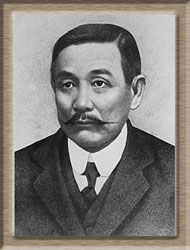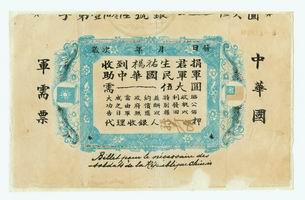Sun Mei

Sun Mei

A military supply ticket signed by Sun Mei
Sun Mei (1854~1915), Sun Yat-sen’s elder brother, also known as Dezhang and Shouping, was born in Cuiheng Village on Day 17 of Month 10 of Year4of Qing Emperor Xianfeng’s reign (December 6, 1854). Sun Mei assisted his father in farming at home in his childhood, went to the neighboring township Nanmeng to be a long-term hired handat the age of 15, and went to Honolulu with his fellow townsmen to make a living in Year 10 of Qing Emperor Tongzhi’s reign (1871). After arriving in Honolulu, Sun Mei first worked at a farm, and then applied for land with the local government for reclamation. His business thengradually developed and expanded due to proper management. In Year 3 of Qing Emperor Guangxu’s reign (1877), the local government allowed Sun Mei to recruit Chinese for farming in Honolulu. In the following year, Sun Mei married a Ms Tan (1862~1938) from Yakou Village in the same county (today’s Yakou Village, Nanlang Town), and gave birth to his son Sun Chang. In Year 6 of Qing Emperor Guangxu’s reign (1880), Sun Mei opened a store on Nuuanu Avenue in Honolulu. Three years later, the store was relocated to the Maui Island in Honolulu for expanded operation. Around Year 11 of Qing Emperor Guangxu’s reign (1885), Sun Mei rented thousands of acres of land on the Maui Island for stockbreeding, hired many workers, and was called the “Maui King”.
In Year 5 of Qing Emperor Guangxu’s reign (1879), Sun Yat-sen went to Honolulu with his mother, and worked at the store of Sun Mei. During 1879-1883, Sun Yat-sen studied at lolani School and Oahu College in Honolulu with Sun Mei’s funding. In Month 10 of Year 20 of Qing Emperor Guangxu’s reign (November 1894), Sun Yat-sen founded the Revive China Society in Honolulu. Sun Mei joined the society and served as chairman of the Maui branch. He supported Sun Yat-sen’s revolutionary activities by all means, even if he was almost bankrupt.
From Year 30 of Qing Emperor Guangxu’s reign (1904) to Year 31, the Hawaii Government promulgated a new land lease ordinance, and Sun Mei’s farm suffered heavy losses. Sun Mei filed an appeal through a lawyer, but lost the case. In mid Month 7 of Year 32 of Qing Emperor Guangxu’s reign (August 1906), Sun Mei declared bankruptcy, closed down his business on the Maui Island, and settled in Kowloon, Hong Kong with his family. Sun Mei’s wife Tan stayed in Maui to auction the remaining properties. At the end of Year 34 of Qing Emperor Guangxu’s reign (1908), Sun Mei’s wife Tan sold the Kula Pasture to Antone Tavares, completing the last property transfer in Hawaii.
Sun Mei continued to support the revolution against the Qing government in Hong Kong. In Month 4 of Year 34 of Qing Emperor Guangxu’s reign (May 1908), Sun Mei disrupted the royalists’ publicity at the Anti-Opium Society in Singapore together with Tian Tong, Deng Ziyu, etc. In the winter of the following year, Sun Mei sewed an uprising flag with Yang Dechu, etc. to support the Guangdong new army’s uprising. In Month 8 of Year 2 of Qing Emperor Xuantong’s reign (September 1910), Sun Mei was deported by the Hong Kong Government for admitting laborers into his party. In November of the same year, he attended the Penang meeting. In 1911, he planned the Guangzhou Uprising. In December, he went to Kwangchowan (former name of today’s Zhanjiang, Guangdong) secretly, was renamed Huang Zhendong, and organized the militia to respond to the Wuchang Uprising. After the founding of Republican China, part of the gentry in Guangdong elected Sun Mei as Governor. On February 21, 1912, Sun Yat-sen dissuaded Sun Mei from entering politics by telegraph, saying: “Although some elect you to be theGovernor of Guangdong, in my opinion, you’d better not accept the governor position, because you’re not familiar with politics, and your character is too uprightto be acceptedin the political circles.You may bethe one the highly anticipated beforestepping on the stage, but may also be the one they hateand complainonce anymistakethey find on you. Instead, you should do something you’re good at, such as providing living support to soldiers and civilians, and running industry.I’ve also heard some intend to threaten others to elect you which will not bea good cause andshould be avoided.” Sun Mei accepted Sun Yat-sen’s advice, and then began to run industry together with his companions at home and abroad to improve people’s livelihoods. He set up Zhongshan Hesheng Company, and ran an oyster pond in Yihe, Jipai, Gongdu, Zhongshanat the end of the same year. Sun Mei was very prestigious locally, and trusted by nearby villagers, who would resort to him to settlement and mediation when they had quarrelor property distribution dispute. Sun Mei moved to Macao in 1913, and died of illness there on February 11, 1915. In 1934, the Central Executive Committee of the Chinese Nationalist Party buried his remains back in Cuiheng Village. In November 2000, the Zhongshan Municipal People’s Government declared Sun Mei’s tomb as a protected cultural relic.

